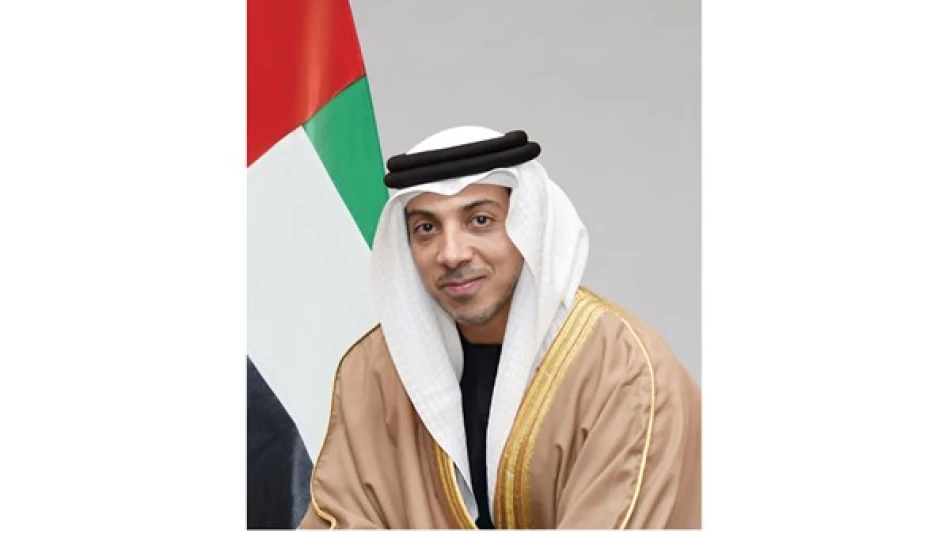
Mansour bin Zayed Visits Liwa Date Festival, Emphasizing Agriculture's Role in Food Security
UAE's Date Palm Festival Showcases Strategic Push for Agricultural Self-Sufficiency
The UAE's 21st Liwa Date Festival has emerged as more than a cultural celebration—it's becoming a strategic platform for the nation's ambitious food security agenda. With Sheikh Mansour bin Zayed Al Nahyan's high-profile visit highlighting the government's commitment, the festival demonstrates how the Emirates is leveraging traditional agriculture to achieve modern economic goals, including reduced food import dependency and sustainable local production.
Leadership Signals Agricultural Priority
Sheikh Mansour bin Zayed Al Nahyan, UAE Deputy Prime Minister and Presidential Court Chairman, toured the festival in Liwa city, Al Dhafra region, underscoring the government's strategic focus on agricultural development. His presence at what might seem like a local cultural event signals deeper policy intentions—transforming traditional date palm cultivation into a cornerstone of national food security.
During his visit, Sheikh Mansour emphasized that the agricultural sector is experiencing significant growth under President Sheikh Mohammed bin Zayed Al Nahyan's directives, with sustained support for farmers, producers, and manufacturers to ensure sustainable food production.
Economic Impact Beyond Cultural Value
Substantial Investment in Agricultural Innovation
The festival offers over 8.7 million dirhams in prizes across various competitions, reflecting serious government investment in agricultural excellence. This prize pool isn't merely ceremonial—it incentivizes innovation in date cultivation, processing, and marketing, creating a competitive environment that drives quality improvements.
The event attracts thousands of visitors annually, generating significant economic activity in the Al Dhafra region. More importantly, it serves as a networking platform connecting farmers, agricultural experts, and industry pioneers, fostering knowledge transfer and business partnerships that extend far beyond the festival dates.
Strategic Regional Development
Sheikh Mansour praised the festival's role in economic diversification, particularly in the Al Dhafra region, traditionally considered peripheral to Dubai and Abu Dhabi's urban centers. This represents a broader UAE strategy of developing secondary cities and rural areas, reducing economic concentration while preserving cultural heritage.
Food Security in the Gulf Context
The UAE's emphasis on date palm cultivation reflects broader Gulf concerns about food security. Unlike oil-rich neighbors who rely heavily on food imports, the UAE is positioning itself as a regional leader in sustainable agriculture. Date palms, perfectly adapted to the harsh desert climate, represent an ideal crop for achieving food self-sufficiency without straining water resources.
This approach contrasts with Saudi Arabia's ambitious but water-intensive agricultural projects, offering a more sustainable model for Gulf food production. The UAE's focus on traditional crops like dates, combined with modern agricultural techniques, could provide a template for other arid regions worldwide.
Cultural Preservation Meets Economic Strategy
The festival successfully balances cultural preservation with economic development. Traditional crafts, palm seedling markets, and heritage demonstrations maintain connection to Emirati identity while supporting local businesses and artisans. This dual approach—honoring tradition while driving innovation—reflects the UAE's broader development philosophy.
The event includes competitions for traditional date varieties, largest date clusters, and palm trunk artistry, preserving agricultural knowledge while encouraging excellence. These competitions serve as informal research and development platforms, identifying superior cultivation techniques and date varieties that could be scaled commercially.
Investment Implications
For investors and agricultural businesses, the UAE's commitment to date palm cultivation signals opportunities in processing, packaging, and export markets. The government's sustained support, evidenced by high-level leadership engagement and substantial prize money, suggests long-term policy stability in agricultural investment.
The festival's emphasis on connecting farmers with experts and industry leaders creates an ecosystem for agricultural innovation, potentially attracting international agtech companies and investors interested in desert agriculture solutions.
Regional and Global Significance
The UAE's agricultural strategy, showcased through events like the Liwa Date Festival, positions the country as a potential food security hub for the region. As climate change threatens traditional agricultural areas globally, the UAE's expertise in desert farming could become increasingly valuable, creating export opportunities for both agricultural products and farming technology.
This festival represents more than cultural celebration—it's a strategic investment in sustainable agriculture, economic diversification, and regional food security that other Gulf states are likely watching closely.
Most Viewed News

 Layla Al Mansoori
Layla Al Mansoori






